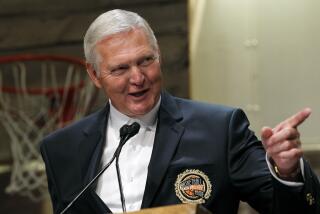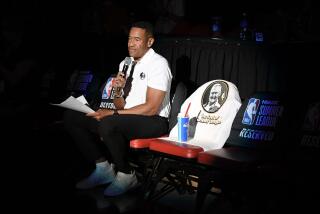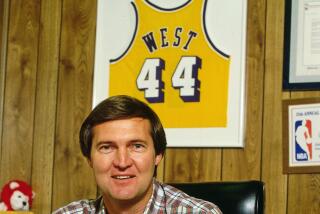‘Jerry West: The Life and Legend of a Basketball Icon’ by Roland Lazenby
- Share via
When I was a boy, my father took me to see my first live professional basketball game downtown at the Sports Arena.
Good parochial school boy that I was, I spent most of the pregame trying to figure out where John F. Kennedy might have stood during the recent Democratic National Convention. Then, I saw the Lakers with Jerry West and Elgin Baylor play the Cincinnati Royals with Oscar Robertson and Jerry Lucas, and I became a fan for life.
In retrospect, it’s easy to understand why I did since, like the Boston Celtics’ Tommy Heinsohn tells Roland Lazenby in his marvelous book “Jerry West: The Life and Legend of a Basketball Icon,” I had seen three of the five finest NBA players ever to take the floor. Nothing I’ve seen in all the long intervening years as a fan and onetime sportswriter would compel me to contradict Heinsohn.
Sports biographies tend to careen between breathless hagiography and the slyly salacious. Lazenby, a prolific author who also has written on Phil Jackson and Kobe Bryant, has produced something of a different order -- a first-rate piece of narrative nonfiction whose subject happens to be a star athlete. His biography of West is, by turns, smart, beautifully reported, well-written and psychologically shrewd. It also manages to put both the NBA and individual players in a telling social and historical context without straying into didacticism.
All those qualities are required to do justice to one of the most complicated, compelling stars in American sports during the last half-century. Today, when the Lakers are the hottest sports ticket in L.A. and Magic Johnson’s “Showtime” teams seem like ancient history, it’s hard for many to recall just how closely West and the Lakers were identified with each other. It wasn’t just that he spent his entire playing career with the team, then went on to coach (with mixed results) and manage it (to brilliant effect) but also that the triumphs and the travails of the team and its star seemed inextricably linked.
Raised in poverty in West Virginia, in a small town outside Cabin Creek, West was the sickly son of a largely absent father, who delighted in Democratic politics and his work with the local union, and an emotionally withholding mother whose manic work ethic and unrelenting perfectionism left their stamp on West. Shy and withdrawn, West preferred solitary fishing and hunting to other activities and, ultimately, took up basketball because he could play it alone. As Lazenby points out, he became one of those rare sports greats who rose to the top with adequate coaching during the most formative years of his career. To the last, his jump shot retained an odd flatness that was the product of long boyhood hours spent on wind-scoured outdoor courts.
There’s no point here in rehearsing the range of West’s achievements as a player, though few may now recall that the NBA’s logo is a silhouette of his dribble. Lazenby’s narrative does justice to all the triumphs and frustrations, particularly the long series of championship losses to Bill Russell’s Celtics -- a sequence that left West wondering if he was laboring under a jinx. Where this book breaks fascinating new ground is in its exploration of West’s tormented perfectionism, a drive for excellence so overweening that it appears to have deprived him of any consistent happiness or satisfaction in his accomplishments.
It took a terrible toll on his personal life, Lazenby writes, leading him to neglect his own children and alienate himself from a loving and, by all accounts, superhumanly supportive first wife. They divorced soon after West retired as a player and, when he met the much younger woman who became his second wife, she recalled him as “empty” and the “saddest” man she had ever encountered.
This was the Jerry West who, after the Lakers finally defeated the New York Knicks in 1972, is remembered by his teammates as the guy in the locker room who took one swig of Champagne and then didn’t seem to know how to celebrate. “I don’t know where I’m going to celebrate,” West said. “The feelings I have now are private ones. I’m going to go home and lock the door.”
As Lazenby reports, when West did that, it was to lose himself in caustically dissatisfied ruminations. West felt the 1972 season had been far from his best as a Laker and always would wonder if this team finally had won a league championship in spite of him. Perhaps, he mused, he’d always somehow impeded the team.
Though West’s mastery of every aspect of the game -- as player, coach and executive -- was complete, he may have been unequaled as a judge of talent. (The Lakers have Kobe Bryant today because of him.) Strangely, it’s in his judgment of other players that he seems most unguarded and relaxed. Speaking of Baylor, for example, he is unstinting and sincere: “It was an honor to play with him. I never considered Elgin Baylor as someone I competed against. He is without a doubt one of the truly great players to play this game. . . . He had that wonderful magic instinct for making plays, for doing things that you just had to watch. I learned from him, from watching him. . . .”
Or there’s this, on his great rival, Robertson: “His greatness was his simplicity. He made every play in the simplest way because his skill level was enormous. It took me a long time to catch up with him.”
West, in his own way, always has had a similar simplicity. Danish philosopher Soren Kierkegaard once said that “purity of the heart is to will one thing.” Assuming that’s true, then Jerry West may have been the purest spirit ever to play the game of basketball -- for he willed one thing, greatness, and achieved it.
Lazenby’s superb account of his career suggests to those of us who, over the years, thrilled at witnessing that stupendous act of will that we can only join with Russell, his old nemesis, and wish Jerry West the happiness to which his achievements entitle him.
More to Read
Go beyond the scoreboard
Get the latest on L.A.'s teams in the daily Sports Report newsletter.
You may occasionally receive promotional content from the Los Angeles Times.










